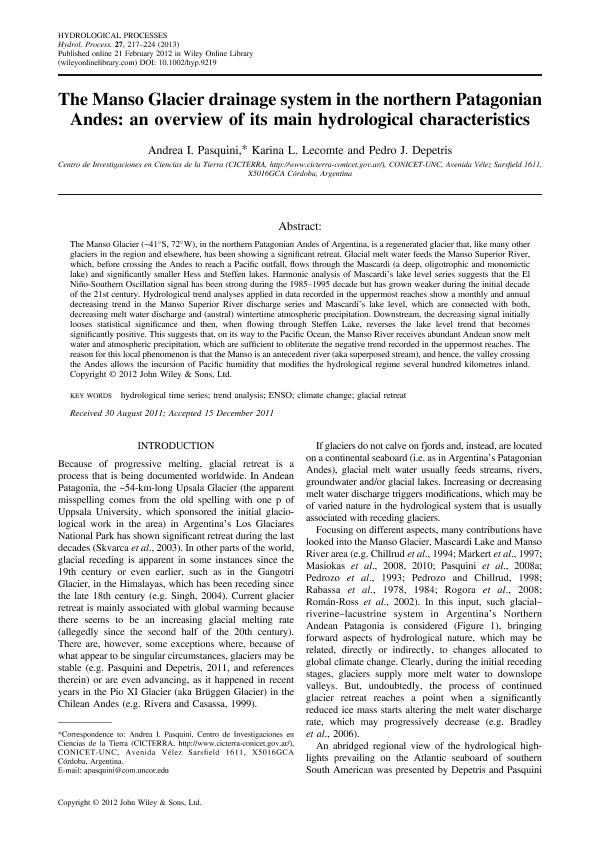Mostrar el registro sencillo del ítem
dc.contributor.author
Pasquini, Andrea Ines

dc.contributor.author
Lecomte, Karina Leticia

dc.contributor.author
Depetris Gallino, Pedro Jose

dc.date.available
2017-09-21T20:31:55Z
dc.date.issued
2012-02
dc.identifier.citation
Pasquini, Andrea Ines; Lecomte, Karina Leticia; Depetris Gallino, Pedro Jose; The Manso Glacier drainage system in the northern Patagonian Andes: an overview of its main hydrological characteristics; Wiley; Hydrological Processes; 27; 2; 2-2012; 217-224
dc.identifier.issn
0885-6087
dc.identifier.uri
http://hdl.handle.net/11336/24858
dc.description.abstract
The Manso Glacier (~41°S, 72°W), in the northern Patagonian Andes of Argentina, is a regenerated glacier that, like many other glaciers in the region and elsewhere, has been showing a significant retreat. Glacial melt water feeds the Manso Superior River, which, before crossing the Andes to reach a Pacific outfall, flows through the Mascardi (a deep, oligotrophic and monomictic lake) and significantly smaller Hess and Steffen lakes. Harmonic analysis of Mascardi's lake level series suggests that the El Niño-Southern Oscillation signal has been strong during the 1985–1995 decade but has grown weaker during the initial decade of the 21st century. Hydrological trend analyses applied in data recorded in the uppermost reaches show a monthly and annual decreasing trend in the Manso Superior River discharge series and Mascardi's lake level, which are connected with both, decreasing melt water discharge and (austral) wintertime atmospheric precipitation. Downstream, the decreasing signal initially looses statistical significance and then, when flowing through Steffen Lake, reverses the lake level trend that becomes significantly positive. This suggests that, on its way to the Pacific Ocean, the Manso River receives abundant Andean snow melt water and atmospheric precipitation, which are sufficient to obliterate the negative trend recorded in the uppermost reaches. The reason for this local phenomenon is that the Manso is an antecedent river (aka superposed stream), and hence, the valley crossing the Andes allows the incursion of Pacific humidity that modifies the hydrological regime several hundred kilometres inland.
dc.format
application/pdf
dc.language.iso
eng
dc.publisher
Wiley

dc.rights
info:eu-repo/semantics/openAccess
dc.rights.uri
https://creativecommons.org/licenses/by-nc-sa/2.5/ar/
dc.subject
Hydrological Time Series
dc.subject
Trend Analysis
dc.subject
Enso
dc.subject
Climate Change
dc.subject.classification
Oceanografía, Hidrología, Recursos Hídricos

dc.subject.classification
Ciencias de la Tierra y relacionadas con el Medio Ambiente

dc.subject.classification
CIENCIAS NATURALES Y EXACTAS

dc.title
The Manso Glacier drainage system in the northern Patagonian Andes: an overview of its main hydrological characteristics
dc.type
info:eu-repo/semantics/article
dc.type
info:ar-repo/semantics/artículo
dc.type
info:eu-repo/semantics/publishedVersion
dc.date.updated
2017-09-21T19:05:07Z
dc.journal.volume
27
dc.journal.number
2
dc.journal.pagination
217-224
dc.journal.pais
Estados Unidos

dc.journal.ciudad
Hoboken
dc.description.fil
Fil: Pasquini, Andrea Ines. Consejo Nacional de Investigaciones Científicas y Técnicas. Centro Científico Tecnológico Conicet - Córdoba. Centro de Investigaciones en Ciencias de la Tierra. Universidad Nacional de Córdoba. Facultad de Ciencias Exactas Físicas y Naturales. Centro de Investigaciones en Ciencias de la Tierra; Argentina
dc.description.fil
Fil: Lecomte, Karina Leticia. Consejo Nacional de Investigaciones Científicas y Técnicas. Centro Científico Tecnológico Conicet - Córdoba. Centro de Investigaciones en Ciencias de la Tierra. Universidad Nacional de Córdoba. Facultad de Ciencias Exactas Físicas y Naturales. Centro de Investigaciones en Ciencias de la Tierra; Argentina
dc.description.fil
Fil: Depetris Gallino, Pedro Jose. Consejo Nacional de Investigaciones Científicas y Técnicas. Centro Científico Tecnológico Conicet - Córdoba. Centro de Investigaciones en Ciencias de la Tierra. Universidad Nacional de Córdoba. Facultad de Ciencias Exactas Físicas y Naturales. Centro de Investigaciones en Ciencias de la Tierra; Argentina
dc.journal.title
Hydrological Processes

dc.relation.alternativeid
info:eu-repo/semantics/altIdentifier/doi/http://dx.doi.org/10.1002/hyp.9219
dc.relation.alternativeid
info:eu-repo/semantics/altIdentifier/url/http://onlinelibrary.wiley.com/doi/10.1002/hyp.9219/abstract
Archivos asociados
